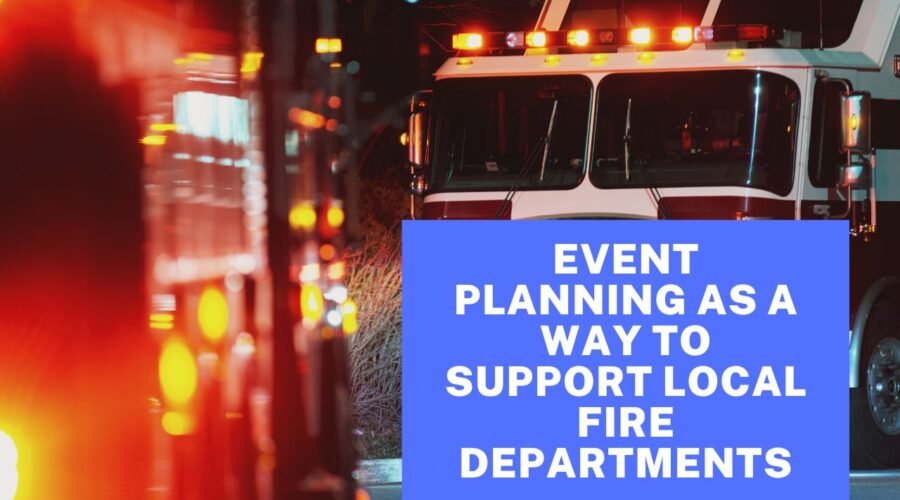Event Planning As A Way To Support Local Fire Departments
Local fire departments are more than emergency responders — they’re community lifelines.
With many departments, especially volunteer-based units, facing shrinking personnel and rising operational costs, event planning has become a powerful tool to raise funds, recruit volunteers, and strengthen community ties.
Events not only generate revenue but also educate the public on fire safety and highlight the crucial role firefighters play in protecting lives and property.
Why Events Matter For Fire Departments
Events do more than just raise money. They:
- Provide critical funds for equipment, training, and facility upgrades.
- Create visible community touchpoints that increase volunteer recruitment and long-term support.
- Act as public-education platforms for fire safety and prevention awareness.
With rising call volumes and declining volunteer numbers, community-driven events have become essential to fill gaps in budgets and staffing.
Types Of Events That Work Best
Different communities respond best to different types of events. The most effective ones include:
- Pancake Breakfasts / BBQs — Low-cost, family-friendly, and high turnout.
- Charity Runs / Walks — Great for sponsorships and participant fundraising.
- Community Safety Fairs / Open Houses — Combines education, donations, and recruitment.
- Raffles & Auctions — High fundraising potential but require legal compliance.
- Premium Experiences (Firefighter For A Day) — Unique, high-ticket events that attract donors.
- Seasonal Festivals / Truck Pulls / Car Shows — Popular community traditions that bring sponsors and large crowds.
The most successful strategy blends recurring small-scale events with one or two major annual fundraisers.
Event Comparison Snapshot
| Event Type | Typical Cost To Run | Fundraising Strengths | Volunteer Load | Compliance Notes |
|---|---|---|---|---|
| Pancake Breakfast / BBQ | Low–Moderate | Community appeal, steady income | Moderate | Food permits, health regulations |
| Charity Run/Walk | Moderate | Participant fees + sponsors | Moderate–High | Street permits, insurance |
| Raffle / Auction | Low–Moderate | High ticket revenue | Low–Moderate | Raffle or gaming laws |
| Safety Fair / Open House | Low | Education + recruitment | Moderate | Venue permits if in public space |
| Premium “Experience” Day | Low–High | High-ticket unique revenue | Moderate | Liability waivers, insurance |
| Seasonal Festival | Moderate–High | Sponsorship + vendor income | High | Food/liquor permits, noise rules |
Planning Checklist — Step By Step
- Set Clear Goals — Define fundraising targets, volunteer recruitment numbers, or awareness goals.
- Form An Event Committee — Assign roles for logistics, marketing, sponsorships, and finance.
- Budget & Revenue Model — Forecast expenses and income streams like tickets, sponsorships, and merchandise.
- Legal & Compliance Review — Confirm raffle laws, permits, insurance, and food/beverage regulations.
- Sponsorship Packages — Offer tiered sponsor benefits such as logo placement and booth space.
- Marketing Plan — Use social media, local press, flyers, and partnerships with schools or businesses.
- Volunteer Scheduling & Training — Provide clear role descriptions and pre-event briefings.
- Safety & Insurance — Secure event liability coverage and create an emergency plan.
- Post-Event Follow-Up — Share results, thank sponsors, and invite attendees to become volunteers or donors.
Maximizing Fundraising- Tips That Work
- Offer unique experiences like ride-alongs or station tours that encourage higher ticket sales.
- Secure sponsorships to cover fixed costs so donations directly support equipment and training.
- Enable digital giving with QR codes, mobile apps, and online donation pages.
- Blend education with fundraising through fire safety demos and interactive kid-friendly activities.
Legal And Ethical Considerations
Events often involve raffles, auctions, or alcohol sales, which require permits or licenses.
Each state or municipality may have unique regulations for nonprofit fundraising, food safety, or alcohol service.
Failing to follow these rules can harm community trust or jeopardize nonprofit status. Always ensure proper compliance before hosting an event.
Measuring Impact — What To Track
To gauge success, fire departments should track:
- Net funds raised after expenses.
- Cost-to-income ratio to assess efficiency.
- Volunteer recruitment numbers and training completions.
- Community reach via attendance, social media engagement, and press coverage.
- Donor retention rates for long-term sustainability.
Real-World Benefits And Trends
Communities with regular fundraising events often report stronger financial stability, upgraded equipment, and increased volunteer sign-ups.
These events also foster stronger bonds between residents and their fire departments, ensuring mutual trust and ongoing support.
Event planning is a powerful strategy to support local fire departments.
When properly executed, it not only raises vital funds but also builds lasting community relationships and attracts new volunteers.
By blending the right mix of events, following a structured planning process, and staying compliant with regulations, departments can transform fundraising into a long-term pillar of community resilience.
FAQs
What type of event raises the most money for a fire department?
Large-scale annual events such as festivals, charity galas, or auctions with corporate sponsors usually generate the most revenue. Smaller recurring events like pancake breakfasts provide consistent year-round income.
Do I need a license to run a raffle for a fire department fundraiser?
Yes, in most cases you’ll need to follow state or local regulations regarding raffles or charitable gaming. Always check local requirements before organizing.
How can events help with volunteer recruitment?
Events allow community members to interact with firefighters, learn about opportunities, and experience the department’s mission firsthand, making it easier to convert attendees into active volunteers.


Leave a Reply